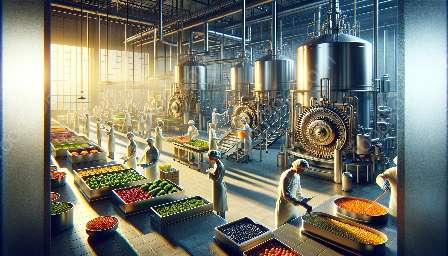Food engineering encompasses a variety of scientific disciplines to improve food production, preservation, and distribution. It is closely related to the field of culinology and plays a crucial role in shaping the future of the food and drink industry. This comprehensive topic cluster will delve into the fascinating realm of food engineering, its significance, and its harmonious relationship with culinology and the dynamic food & drink sector.
The Fundamentals of Food Engineering
At its core, food engineering integrates principles from various disciplines such as chemistry, biology, physics, and engineering to understand and enhance food processes and products. The objective is to optimize not only the quality and safety of food but also its economic and environmental sustainability throughout the entire supply chain.
Key Aspects of Food Engineering
Food engineering encompasses a wide array of critical aspects including food preservation, packaging, sensory analysis, ingredient functionality, and process optimization. By leveraging advanced technologies and methodologies, food engineers aim to develop innovative solutions that meet consumer demands while addressing global food challenges.
Food Preservation and Safety
One of the primary focuses of food engineering is to develop effective preservation techniques that extend the shelf life of perishable food products without compromising their nutritional value and sensory attributes. This includes methods such as thermal processing, freezing, dehydration, and packaging technologies that prevent contamination and maintain product integrity.
Ingredient Functionality and Optimization
Food engineers analyze the properties and interactions of various ingredients to enhance their functionality in food formulations. By understanding the behavior of ingredients under different processing conditions, they can optimize product texture, stability, and overall quality, contributing to the development of new and improved food products.
Sustainability and Innovation
In today's rapidly evolving food industry, sustainability and innovation are paramount. Food engineers play a vital role in developing eco-friendly practices and technologies that reduce waste, conserve resources, and minimize environmental impact. This includes the use of biodegradable packaging, energy-efficient processing methods, and novel food production techniques.
The Intersection of Food Engineering and Culinology
Culinology, a blend of culinary arts and food science, shares a symbiotic relationship with food engineering. It integrates the creativity of chefs with the scientific knowledge of food engineers to create delicious and innovative food products that cater to evolving consumer preferences and trends. The collaborative efforts of culinologists and food engineers result in the development of unique recipes, flavors, and textures, while ensuring the products meet stringent safety and quality standards.
Impacting the Future of Food & Drink
Food engineering significantly influences the future of the food and drink industry by driving advancements in food production, processing, and packaging. From creating functional foods and beverages to implementing state-of-the-art manufacturing technologies, food engineers contribute to the continuous evolution of the industry, addressing consumer needs and demands while upholding the highest standards of food safety and quality.
Emerging Technologies and Trends
The dynamic nature of food engineering fosters the emergence of cutting-edge technologies and trends that shape the future of food and drink. This includes the utilization of artificial intelligence and robotics in food processing, the development of personalized nutrition solutions, and the exploration of alternative protein sources to meet the demands of a growing global population.
Cross-Industry Collaboration
Furthermore, food engineering encourages seamless collaboration with other industries such as biotechnology, nanotechnology, and pharmaceuticals, leading to interdisciplinary innovations that transcend traditional boundaries. This cross-pollination of knowledge and expertise enhances the ability to address complex challenges and develop groundbreaking solutions for the benefit of the food and drink sector.
Conclusion
Food engineering, intricately woven with culinology and the food & drink industry, embodies the essence of scientific exploration and gastronomic creativity. By continuously pushing the boundaries of innovation and sustainability, food engineers and culinologists drive the evolution of the culinary landscape, ensuring that the pleasures of food and drink are harmoniously intertwined with technological advancements and global responsibility.




















